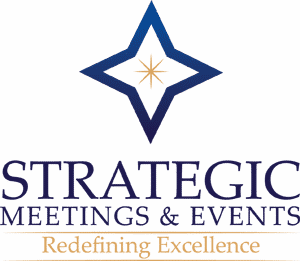Planners Feeling Pressure of Rising Costs – Squeezed!
By Marshall Krantz
Squeezed! Planners feeling pressure of rising costs, budget constraints, and executive scrutiny of meetings.
 For the coming year, the message from meeting planners is clear: The most pressing issues they will face are rising event costs and related budget pressures in the face of a slowing overall economy.
For the coming year, the message from meeting planners is clear: The most pressing issues they will face are rising event costs and related budget pressures in the face of a slowing overall economy.
Nearly 75 percent of planners said a likely budget squeeze next year worries them most, according to MeetingNews’ exclusive Outlook 2007 survey conducted early in the fourth quarter. Related to their expense concerns are airline woes, which rated as the second-most pressing issue among respondent planners (41 percent), and executives’ perceptions of the value of meetings, which rated third (31 percent).
There’s plenty of evidence that of planners feeling pressure of rising costs and planners’ budget fears are well founded. Most industry forecasters predict rising prices for travel and lodging next year — albeit at a slower rate than this year. The average cost of a domestic business trip in North America, including air transportation, car rental, and lodging, will increase 4.5 percent, or $46, next year to about $1,060, according to the American Express Business Travel 2007 Forecast released in October. The average cost of an international trip, including air and lodging, will increase 4.6 percent, or $180, to about $4,090.
The corporate travel management giant forecasts that published hotel room rates in North America will rise between three and eight percent at upscale hotels and between two and six percent at mid-range hotels, although rate hikes could vary dramatically among destinations, even those within the same competitive set.
At the top of the list, naturally, is New York City, where room rates could rise by as much as 18 percent, the American Express report stated. Meanwhile, according to lodging tracker Smith Travel Research, the average daily room rate in Manhattan topped $300 this past September.
American Express predicts that published airfares in North America will increase three to six percent for coach-class domestic flights and two to six percent for business-class international flights.
An Alarming Disconnect
Next year, a lot of planners feeling pressure of rising costs will find themselves caught between higher supplier prices and bosses who want to hold the line on travel and meeting expenses.
“There’s a lot of frustration because of rising airfares and hotel rates,” said Kim Hester, director of meeting and incentive sales for Travel Dynamics Group, a corporate travel agency in La Jolla, CA. “Our clients want to do the same things next year for the same or less money. They understand that prices are going up, but they’re resisting. It’s a tug of war.”
Slowing economic growth — only a 2.2 percent rise next year versus 3.4 percent this year, predicts Boston-based analyst and consultant Global Insight — is compounding planners’ problems.
Companies want to curtail expenditures as a way to counteract the slowing growth yet must work harder in a more competitive environment to grow their top line. Sales people can cut a significant amount of transient travel through webconferencing, pitching to clients using electronic meeting solutions from WebEx or similar providers. But remote conferencing has, to this point, proved ineffective in supplanting larger meetings, in which face-to-face networking typically plays a vital role.
The majority of planners expect their meetings activity to remain about the same next year as this year. But there is a two-to-one margin of planners who expect their organizations will hold more meetings away from the office next year over planners who anticipate fewer such meetings. And there’s a three-to-one margin of planners who expect more people to attend their meetings next year over planners who expect fewer attendees at their meetings.
Nearly half of planners believe their average per-attendee spending will remain the same in 2007. But a hefty 40 percent believe per-attendee spending will increase while only about 11 percent believe it will decrease.
Planners’ fears that senior executives will scrutinize travel and meeting expenditures ever more closely also appear well founded. In its 2007 forecast, American Express predicted that companies will tighten their travel policies next year as well as enforce those policies more strictly.
“We’ve seen a substantial shift in our clients’ perception of how to be successful,” said Mike Streit, vice president of advisory services for American Express Business Travel. “They’re past looking to traditional procurement methodology; it’s no longer just about leveraging costs.
“In a seller’s market,” Streit continued, “you have to look at everything. Companies must look at their own culture, from when and how they travel to where they travel. This is the primary topic with clients — how to approach their travel program more holistically.”
 A holistic approach essentially means that companies look harder at which business trips promise the best return on investment, factoring in not only typical travel considerations like destination and hotel class that can drive up after costs but also a trip’s purpose and the number and level of personnel involved.
A holistic approach essentially means that companies look harder at which business trips promise the best return on investment, factoring in not only typical travel considerations like destination and hotel class that can drive up after costs but also a trip’s purpose and the number and level of personnel involved.
As a result of tighter corporate travel policies, companies could cut not only the number of people they send to their own meetings but also to external events such as trade shows, association conventions, and other companies’ customer conferences. Planners feeling pressure of rising costs of external events may also find it harder to fill their room blocks as attendees adhere to stricter corporate mandates to stay at their companies’ preferred lodging suppliers.
In the MN survey, decreasing the number of attendees at events falls near the bottom of the list of tactics organizations are using to fight higher hotel prices. But significantly, more than 16 percent of corporate planners said their companies intend to send fewer people to events, a response rate six times greater than that from association planners.
The expected budget squeezes will also likely prompt companies to adopt comprehensive meetings management programs rather than merely contemplate the idea, according to Streit. “We expect to see a growing number of corporations hone in on meetings spending,” he said. “This area, until now, has been under-examined and is ripe for savings and control opportunities.”
While there’s no question that corporate procurement officers have focused on travel and meetings in recent years, Travel Dynamics Group’s Hester agreed companies could do much more to rein in expenses. “There’s a big increase in controls, but the ‘exception’ rate is high,” she said, referring especially to flight changes. “They start with the best of intentions but then say, ‘We’ll have to change to the $1,800 ticket.'”
Shifting Destinations & Formats
While control of air costs remains a struggle for many of Hester’s clients, she said they more readily embrace less expensive destinations, the number one tactic for dealing with high hotel rates in the MN survey.
“Some groups want to go to New York,” she said. “But when I quote rates, they decide they want to go somewhere else. If it’s mid-week during spring and fall, you pay over $400 a night to stay at a four-star hotel in Manhattan. In Atlanta, that same hotel might cost $250.
“You also save on food and beverage in less expensive destinations,” Hester added. “In New York, a full American breakfast costs about $50, not including tax and tip. In Atlanta, a full American breakfast costs about $30, with tax and tip. Anywhere in the South is much less expensive than places like New York, Chicago, Washington, Philadelphia, or Boston.”
 One strategy that corporations are adopting to combat higher prices for both air and lodging is splitting internal national meetings into regional events. One pharmaceutical company that has held a national sales meeting every year for the past five years plans to hold three regional meetings next year by dividing the group of 600 attendees evenly between Baltimore, Atlanta, and Los Angeles, according to Harith Wickrema, owner of Harith Productions, an independent planning company in Willow Grove, PA.
One strategy that corporations are adopting to combat higher prices for both air and lodging is splitting internal national meetings into regional events. One pharmaceutical company that has held a national sales meeting every year for the past five years plans to hold three regional meetings next year by dividing the group of 600 attendees evenly between Baltimore, Atlanta, and Los Angeles, according to Harith Wickrema, owner of Harith Productions, an independent planning company in Willow Grove, PA.
Wickrema said his client expects a significant cut in entertainment expenses because it will no longer need the big production it usually stages for the national event’s gala night. He noted that he might hire a three-piece band for each regional event. By contrast, entertainment for a single large event usually requires a keynote speaker, a bigger band and possibly other entertainers, elaborate decor, and the equipment and staffing to carry off a large production. Wickrema figures the client will save about two-thirds of what it would otherwise spend — without skimping on food and beverage. “You don’t want cheap food,” Wickrema stressed. “You don’t want employees to feel demotivated.”
For the Baltimore meeting, most attendees will drive or take public ground transportation, said Wickrema, while many attendees at the Los Angeles meeting will fly on a low-fare carrier like Southwest Airlines — thus saving the company a substantial amount on airfare.
In addition, Wickrema said the smaller groups save on hotel rates. “It’s easier to find availability and better rates when you have 200 people instead of 600 people,” he noted, explaining that transient rates are generally higher than group rates in an “up” market.
Groups typically book months in advance, while transient travelers generally book just days or weeks prior to arrival. Thus, Wickrema argued, smaller groups leave hotels more rooms to sell at higher rates — rooms that hoteliers feel confident they can sell on short notice given high demand.
Wickrema also persuaded his client to arrive on Sunday night instead of the usual Monday night. Hoteliers, especially in city centers, often suffer lower occupancy rates on Sunday because it’s a transition day between weekend leisure guests and weekday business travelers. So Sunday night arrivals represent a benefit to hotels that can accrue back to groups in lower rates. “The hotel is thrilled because it is filling rooms on a night when the hotel could be empty,” he said.
Negotiating better group rates often requires booking further in advance. Nonetheless, many companies shrank their booking windows during the weak economic period that followed the 9/11 attacks. They felt nervous about committing funds to meetings scheduled beyond the next quarterly report.
But buoyed by better balance sheets and pressured by rising hotel rates and tighter availability, many companies are once again extending their meetings booking windows.
Booking further in advance is the third most popular tactic among planners for fighting higher hotel rates, according to the MN survey. The survey also found that more than 20 percent of planners expect their booking windows to increase while only about six percent of planners expect their windows to decrease. The vast majority of planners — 70 percent — expect their average lead time to remain about the same.
“My clients are aware of the higher rates and limited space, so they’re booking well in advance,” said Christy Lamagna, president of Strategic Meetings and Events, an independent planning company in Bernardsville, NJ. “Before we finish this year’s annual meeting, they’re already thinking about next year’s meeting. They’ve learned that hotels are still a little more flexible with rates if they book earlier and not when they’re being reactive at the last minute.”
Like Wickrema, Lamagna is also seeing more flexibility on meeting dates from clients as a way to win better lodging deals. “It gives the hotels a greater ability to tuck meetings into their calendar,” she said, adding, “It’s harder right now to negotiate with hotels. Their phones are still ringing with business.”
Tags: Squeezed Planners Feeling Pressure of Rising Costs, Planners Feeling Pressure, Event Planning, Event Planners, Strategic Planners, Strategic Events, Corporate Meetings, Corporate Events, Successful Meetings





